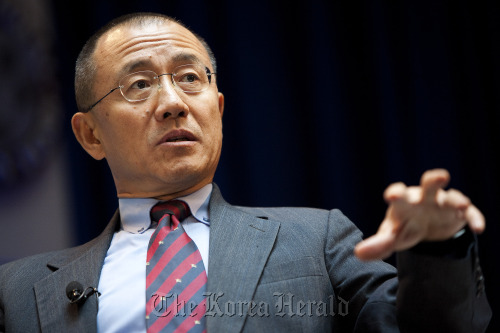China Investment Corp. has stopped buying European government debt because of an economic crisis on the continent, though it continues to look for new investments there, said CIC President Gao Xiqing.
“What is happening in Europe right now is of course of concern,” Gao said Wednesday in an interview in Addis Ababa, Ethiopia, during the World Economic Forum on Africa. “We still have our people looking at opportunities in Europe, even though we don’t want to buy any government bonds.”
European leaders are struggling to contain a debt crisis that has entered its third year and led to bailouts of Greece, Portugal and Ireland. Officials have pledged to tighten fiscal frameworks amid concern the situation would envelop Italy and Spain, the euro region’s third- and fourth-biggest economies.
“China has a significant interest in Europe being a strong economic region; that’s clearly not the case at the moment,” said Stephen Halmarick, Sydney-based head of investment market research at Colonial First State Global Asset Management, which oversees about $150 billion. “It’s probably not surprising that the Chinese authorities are looking elsewhere for investment. Other investors in other parts of the world will be very cautious about European debt at this moment.”
 |
Gao Xiqing, vice chairman, president and chief investment officer of China Investment Corp. (Bloomberg) |
The euro posted its longest slump since 2008 and European shares fell to the lowest in almost four months as concern that Greece will be forced out of the euro zone grew. Spain said Wednesday it would take over Bankia SA, the banking group with the most Spanish real estate, as part of efforts to bolster confidence in the country’s lenders.
The Chinese sovereign wealth fund would “love” to boost investments in Africa, Gao said. The company is limited in how much it can invest in Africa because the projects are not large enough to fit its investment criteria, he said.
The fund is boosting investments outside of China as it seeks to increase returns on the nation’s foreign currency reserves and secure commodity supplies. The Chinese government injected about $50 billion this year in the sovereign wealth fund, Gao said. The government has not made a decision on whether to regularly inject capital into the company, he said.
“Right now, we are busy enough, so we don’t worry terribly about recapitalization,” he said. “In the long run, we should do something about it.”
The company only considers investments of at least about $100 million in African companies and wants to take no more than a 10 percent stake in them, he said. There are not many companies outside of the mining industry in Africa that fit those criteria, making spending on the world’s poorest continent a challenge, he said.
The ventures need to have a return that is on average about 200 basis points, or 2 percentage points, more than investments in the developed world, he said.
CIC will buy 25 percent of former South African politician Cyril Ramaphosa’s Shanduka Group for 2 billion rand ($251 million), the company said on Dec. 22.
(Bloomberg)








